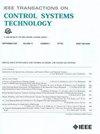Stator Flux Observers for Speed-Controlled PMSMs in Low-Speed Sensorless Applications: Comparative Tests and Hybrid Strategy
IF 3.9
2区 计算机科学
Q1 AUTOMATION & CONTROL SYSTEMS
引用次数: 0
Abstract
In-depth performance analysis of stator flux observers (SFOs) is carried out, in the very low-speed range, for sensorless speed-controlled drives based on permanent magnet synchronous machines (PMSMs), in the presence of no idealities of the voltage source inverter (VSI) and uncertainties in the motor electrical parameters. The original contribution of this brief is twofold. First, it relies on the presentation of experiments, within this framework, which comparatively illustrate the closed-loop performance of: 1) a stator flux (open-loop) estimator with a low-pass filter (LPF), endowed with an additional phase shift and magnitude compensation based on the estimation of machine speed and 2) two adaptive observers constituting the most recent representatives of the class of the theoretically based contributions for PMSMs. While the former can achieve more satisfactory results when speed variations are relatively small, its performance degrades—when speed variations become relevant—when compared to the aforementioned adaptive SFOs which, in turn, still exhibit the advantage of estimating an additional critical parameter (under reliable knowledge of the motor inductance) related to demagnetization effects. Indeed, the crucial role of the adaptation is highlighted throughout the sections, while the conditions underlying the design and the stability proofs of such adaptive SFOs are shown to provide actually effective tools and restrictions under which satisfactory performances for the considered adaptive SFOs can be achieved in practice. Second, the common notation of the brief finally leads to the original formulation of a new comprehensive set of equations that simultaneously covers all the tested solutions and defines a hybrid strategy that might be very effective in practical applications.低速无传感器调速永磁同步电机的定子磁链观测器:比较测试和混合策略
在无理想电压源逆变器(VSI)和电机电气参数不确定的情况下,对基于永磁同步电机(PMSMs)的无传感器调速驱动器的定子磁链观测器(sfo)在极低速范围内的性能进行了深入分析。本摘要的原始贡献是双重的。首先,它依赖于实验的呈现,在这个框架内,比较地说明了闭环性能:1)具有低通滤波器(LPF)的定子磁链(开环)估计器,具有基于机器速度估计的附加相移和幅度补偿;2)两个自适应观测器构成了基于理论贡献的永磁同步电机类的最新代表。虽然前者在速度变化相对较小时可以获得更令人满意的结果,但与上述自适应sfo相比,当速度变化变得相关时,其性能会下降,而后者反过来仍然具有估计与退磁效应相关的附加关键参数(在可靠的电机电感知识下)的优势。事实上,整个章节都强调了自适应的关键作用,而这种自适应sfo的设计条件和稳定性证明提供了实际有效的工具和限制,在这些工具和限制下,所考虑的自适应sfo可以在实践中实现令人满意的性能。其次,简报的共同符号最终导致了一组新的综合方程的原始公式,该公式同时涵盖了所有已测试的解决方案,并定义了在实际应用中可能非常有效的混合策略。
本文章由计算机程序翻译,如有差异,请以英文原文为准。
求助全文
约1分钟内获得全文
求助全文
来源期刊

IEEE Transactions on Control Systems Technology
工程技术-工程:电子与电气
CiteScore
10.70
自引率
2.10%
发文量
218
审稿时长
6.7 months
期刊介绍:
The IEEE Transactions on Control Systems Technology publishes high quality technical papers on technological advances in control engineering. The word technology is from the Greek technologia. The modern meaning is a scientific method to achieve a practical purpose. Control Systems Technology includes all aspects of control engineering needed to implement practical control systems, from analysis and design, through simulation and hardware. A primary purpose of the IEEE Transactions on Control Systems Technology is to have an archival publication which will bridge the gap between theory and practice. Papers are published in the IEEE Transactions on Control System Technology which disclose significant new knowledge, exploratory developments, or practical applications in all aspects of technology needed to implement control systems, from analysis and design through simulation, and hardware.
 求助内容:
求助内容: 应助结果提醒方式:
应助结果提醒方式:


